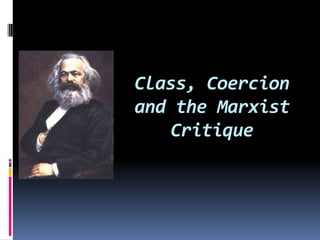
Class, Coercion and the Marxist Critique
- 1. Class, Coercion and the Marxist Critique
- 2. In the Philosophy of Life, Hegel portrayed the Prussian state as divided into three substantive divisions – the legislature, the executive and the crown – which together express ‘universal insight and will. The most important institution of the state is the bureaucracy, an organization in which particular interests are subordinated to a system of hierarchy, specialization, expertise and coordination on the one hand, and internal and external pressures for competence and impartiality on the other.
- 3. Marx’s emphasis on the structure and corporate nature of bureaucracies is significant because it throws into relief the ‘relative autonomy’ of these organizations and foreshadows the arguments elaborated in what may be his most interesting work on the state, The Eighteenth Brumaire of Louis Bonaparte. The study highlights Marx’s distance from any view of the state as an ‘instrument of universal insight’ or ‘ethical community’ for he emphasized that the state apparatus is simultaneously a ‘parasitic body’ on civil society and an autonomous source of political action.
- 4. The analysis offered in The Eighteenth Brumaire, like that in the Critique, suggests that the agents of the state do not simply coordinate political life in the interests of the dominant class of civil society. He emphasized the importance of its information network as a mechanism for surveillance, and the way in which the state’s political autonomy is interlocked with its capacity to undermine social movements threatening to the status quo.
- 5. Marx (and indeed Engels) insisted on the direct dependence of the state on the economic, social and political power of the dominant class The state, in this formulation, serves directly the interest of the economically dominant class: the notion of the state as a site of autonomous political action is supplanted by an emphasis illustrated by the famous slogan of the Communist Manifesto. ‘The executive of the modern state is but a committee for managing the common affairs of the whole bourgeoisie’.
- 6. The state, nevertheless, is characterized as essentially dependent upon society and upon those who dominate the economy: ‘independence’ is exercised only to the extent that conflicts must be settled between different sections of the capital (industrialists and financiers, for example), and between ‘domestic capitalism’ and pressures generated by international capitalist markets. On the basis of position 1 it is possible to think of the state as a potential arena of struggle, which can become a key force for socialist change.
- 7. In contradistinction, revolutionary socialist traditions developed from position 2. Following Marx’s analysis, Lenin insisted that the eradication of capitalist relations of production must be accompanied by the destruction of the capitalist state apparatus: the state, as a class instrument, had to be destroyed and direct democracy – as imagined in part by Rousseau – must be installed. Accordingly, a dominant economic class can rule without directly governing, that is, it can exert determinate political influence without even having representatives in government. This idea retains a vital place in contemporary debates among Marxists, liberal democratic theorists and others.
- 8. Lenin (1870-1924) followed the tenets of Marx’s position 2. His views are stated succinctly in State and Revolution where he listed his first task as the ‘resuscitation of the real teaching of Marx on the state’ . Lenin conceived of the state as a ‘machine for the oppression of one class by another’.
- 9. Although State and Revolution reiterates what I have called Marx’s position 2, Lenin made more than Marx did of one central point: the crystallization of class power, within the organs of state administration Strong central control would be necessary after the Revolution, but a precondition of revolutionary success is the destruction of the ‘old state machine’.
- 10. There are many tensions in Lenin’s treatment of the state and political organization. He thought the work of the new socialist order could be conducted by workers organized in a framework of direct democracy (soviets), yet he defended the authority of the party in nearly all spheres. His argument that state bureaucracies need not entail fixed positions of power and privilege is suggestive, but it remains, especially in light of the massive problem of organization faced during and after the Revolution, a very incomplete statement.
- 11. Contemporary Marxism is, however, in a state of flux.There are now as many differences between Marxists as between liberals or liberal democrats. Moreover, the reconsideration of the classical Marxist account of the state had led to a reappraisal by some Marxists of the liberal democratic tradition with its emphasis on the importance of individual liberties and rights, that is, citizenship
- 12. Bureaucracy, Parliaments and the Nation-state
- 13. Max Weber (1864-1920), a founder of sociology, a champion of European liberalism and of the German nation-state, contested this view In contrast to Marx, Engels and Lenin, Weber resisted all suggestion that forms of state organization were ‘parasitic’ and a direct product of the activities of classes. He dismissed the feasibility of direct democracy. Where the group grows beyond a certain size or where the administrative function becomes too difficult to be satisfactorily taken care of by anyone whom rotation, the lot, or election may happen to designate.
- 14. Weber developed one of the most significant definitions of the modern state; placing emphasis upon two distinctive elements of its history: territoriality and violence. The growing complexity of the administrative tasks and the sheer expansion of their scope increasingly result in the technical superiority of those who have had training and experience, and will thus inevitably favor the continuity of at least some of the functionaries.
- 15. End Report
